 The Securities and Exchange Commission of Pakistan (SECP) said on Tuesday it had proposed amendments to the Companies Regulations 2024 to set up a centralized UBO Registry for the corporate sector in line with guidelines on financial transparency by the Financial Action Task Force (FATF).
The Securities and Exchange Commission of Pakistan (SECP) said on Tuesday it had proposed amendments to the Companies Regulations 2024 to set up a centralized UBO Registry for the corporate sector in line with guidelines on financial transparency by the Financial Action Task Force (FATF).
UBOs (Ultimate Beneficial Owners) are the owners or the persons who are in charge of a company. A UBO register helps to prevent financial and economic crimes such as money laundering, financing terrorism, tax fraud, and corruption. The register makes it clear to whom money is sent so any potential financial crimes cannot be hidden behind a corporation.
“In terms of the proposed changes, companies would be required to submit UBO information, already being obtained from their shareholders, to the Commission [SECP] through the eZfile portal along with other relevant regulatory returns/forms,” the SECP said in a statement.
“This information can be accessed by Financial Institutions, as and when required.”
Pakistan was removed in 2022 from a FATF grey list that warranted increased surveillance for terrorism financing. Pakistan was listed in 2018 because of “strategic counter-terrorist financing-related deficiencies.”
“In line with FATF standards, the centralized corporate UBO Registry will ensure maintenance of an accurate, up-to-date and comprehensive UBO data. This reform is expected not only to highlight Pakistan’s commitment to global best practices but also strengthens investor confidence in the country’s financial ecosystem,” SECP said.
The Commission said the centralized registry concept was aimed at boosting financial transparency and aligning Pakistan’s ‘Anti-Money Laundering and Countering the Financing of Terrorism’ framework with global standards set by FATF, the Organization for Economic Cooperation and Development (OECD) and other international organizations.
Separately, the SECP has notified the final amendments to the Non-Banking Finance Companies and Notified Entities Regulations, 2008.
These reforms primarily focus on revising the Total Expense Regime (TER) for mutual funds and pension funds while introducing significant measures to enhance the Shariah compliance framework within the mutual fund industry.
As part of the amendments, the existing Total Expense Ratio (TER) capping regime will be replaced with caps on management fees, effective July 1, 2025, as per the press release issued today.
This transition period provides Asset Management Companies (AMCs) and Pension Fund Managers (PFMs) with adequate time to adjust their business strategies.
To improve transparency and aid investor decision-making, AMCs and PFMs must also provide detailed TER disclosures for mutual funds and pension funds.
To strengthen Shariah compliance in the industry, the amendments introduce a relaxation for obtaining a Shariah Compliance Certificate for Collective Investment Schemes (CIS) that share a similar structure and strategy with an existing Shariah-compliant scheme.
Additionally, all CIS lacking a Shariah Compliance Certificate must obtain one by September 30, 2025.
Furthermore, an Annual Shariah Advisor’s Report will now be included in the financial statements distributed to unit holders and Voluntary Pension System (VPS) participants.
The amendments were finalized following extensive stakeholder consultations, including engagements with AMCs, PFMs, and the Mutual Funds Association of Pakistan (MUFAP).
Through this collaborative process, consensus was reached on amendments aimed at promoting transparency, cost efficiency, and alignment with international best practices in the mutual fund and pension fund sectors.